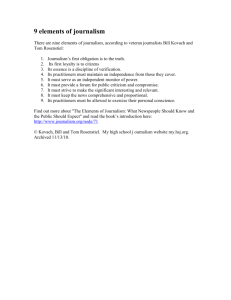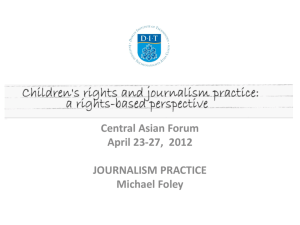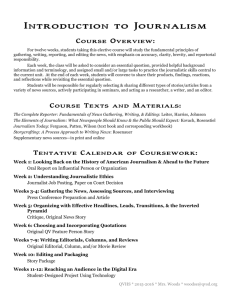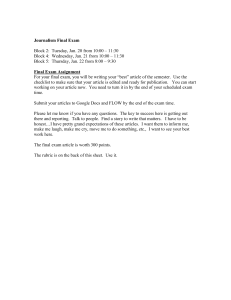PowerPoint File - International Symposium on Online
advertisement
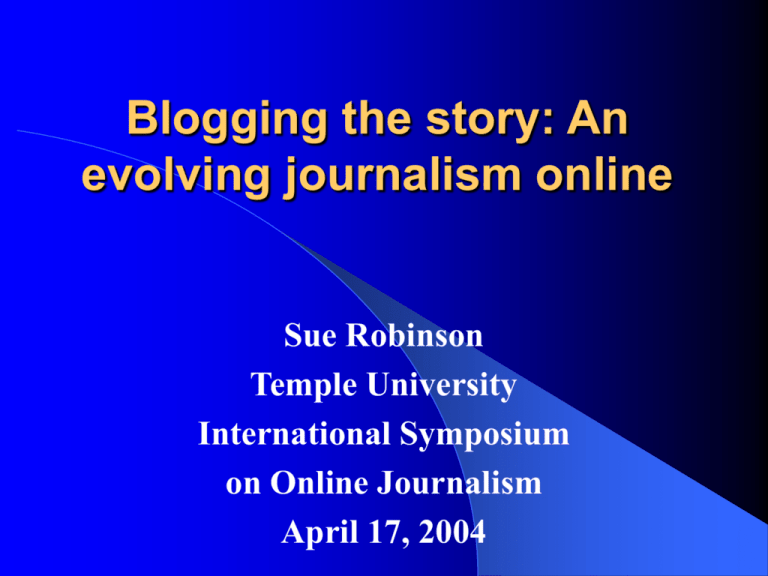
Blogging the story: An evolving journalism online Sue Robinson Temple University International Symposium on Online Journalism April 17, 2004 What’s a blog? Cross between column, news story, diary Perfect place to display short-form reporting, short-form analysis, shortform writing? Perfect to spur national debate? Journalism? Research questions Do blogs rate as journalism? How might the nonlinear nature of online writing, and these particular blogs, affect news delivery? How are truth, independence, credibility, and authorship being established in J-blogs? How do journalists negotiate and (re)interpret traditional news frames in the online medium? Answering the questions Textual analysis of 114 J-blogs in mainstream news publications Scrutinized 15 J-blogs’ implications for journalism The J-code Kovach & Rosenstiel’s 9 elements of journalism Obligation to truth Loyalty to citizenship Discipline of verification Independence from sources Monitor of power Forum for debate Significant accounts interesting and relevant Comprehensive and proportional news Ethical obligation The result To set the agenda for societal debate (McCombs & Shaw, 1972) Reinforces the dominant hegemony of democratic, capitalist America: “Although journalists do not set out to report the news so that the existing politico-economic system is maintained, their professional norms end up producing stories that implicitly support the existing order” (Soloski, 1989/1997, p.144) News repair (Bennett et al, 1985) Postmodern journalism New journalism such as “In Cold Blood” Information age: Dismissal of dominant identity Globalization: Loss of any one power Time is nonlinear History: Different stories of multiple passages of time Narratives are reader interpreted (Jameson, 1981) Blogging journalism Framing in multiple ways Computers have kaleidoscope powers (Murray, 1997) Audience agency: Both dancer, musician Hyperlinks: The never-ending story J-blogs: The ultimate news? (Murray, 1997; Landow, 1997; Wendland, 2003) Where does that leave traditional norms and values? Elements of a blog Journalism as “truth” Must synthesize relevant, significant information (Kovach & Rosenstiel) Even columns must be true, verified “Rather than rushing to add context and interpretation, the press needs to concentrate on synthesis and verification” (Kovach & Rosenstiel, 2001, p.47). Journalism as truth (cont.) Linking to other “truths” Context, interpretation well documented Synthesis, verification not present “Journalism” repair The New Republic: http://www.tnr.com/blog/campaignjournal Drudge and others are hyping the fact that Boston Globe reporter Patrick Healy has sent out an e-mail correcting the transcript of John Kerry's recent comments at a Florida fund-raiser. Kudos to Healy for double-checking and correcting his reporting, but the fact that Kerry said “more leaders” instead of “foreign leaders” doesn't change the substance of what he said…. Instead of unconvincingly spinning Healy's correction as proof that Kerry was misunderstood--when he clearly was not-why not just let the story die a natural death? (Posted March 16) Independence, loyalty to citizens Must be objective, free from ties in order to perform “watch-dog” function (Kovach & Rosenstiel) Seattle Post-Intelligencer: http://seattlepi.nwsource.com/lincoln/journal/ Visited the ship’s captain on the bridge and he noted that the media’s stories have softened after our few weeks onboard. We’re getting to know the crew, he said. True. We’ve met amazing, dedicated people aboard. But that word “soft” – it worries me. There’s such a dearth of hard news on the Lincoln. (March 25, 2003) Verification, debate forum Sources, readers “verify” “We knew that there is plenty of other very good reporting out there. And we knew that to have credibility with the reader we couldn’t just say, well, here’s what The Times is reporting and ignore everybody else” -- the NYTimes.com editor on new blog “Times on the Trail” Reader “repair” Significant, proportional Banal mixes with action Rarely contain news in traditional sense New form of news Florida Today (Feb. 1, 2003) http://www.floridatoday.com/journal/020103landing.htm 9:06 a.m.: “Ten minutes from wheels down.” 9:20: “NASA has lost communication with the orbiter and has no tracking data.” 9:28: “Mission control is silent. There was never a sign of the orbiter here. There was brief discussion of an instrumentation problem aboard the orbiter just before communications was lost but no explanation. Then, Merritt Island tracking station did not pick up the orbiter's signal. It was believed last contacted over Texas.” 9:32: “A search and rescue team is being dispatched to Texas, where it is believed the orbiter broke up during descent. Very, very little is being said here about what has happened in part because officials appear not to know yet.” Postmodern Writing Multiple entries, endings Porthole to rest of “story” Meaningless, or multi-meaning Austin Statesman: http://www.austin360.com/xl/content/xl/index.html …Whatever. So I flew to Columbus, Ohio, two weekends ago to visit the girl, Ms. Laura, who was formerly my girlfriend but became just a friend when she moved back home, yet has reclaimed the title of girlfriend, even though my contract says I will never, ever do a longdistance relationship and my lawyer, doctor and editor have advised against such lunacy. I ignored all of this, because snuggles are fun. (Posted, March 15, 2004) Blogging new forms, sort of Corporate answer to independent blogs and the Internet News repair still happening, but with a postmodern twist Readers shaping own frames, “truths” Are traditional J-values even more important then? “As sources, perspectives and therefore values multiply and diversify, journalism objectivity becomes even more necessary than it is today.” (Gans,. 1979, p.315) VS “If journalists tell their stories on behalf of a normative order, they may be doing so to an ever smaller and less attentive audience.” (Cook, 1996, p. 479)
